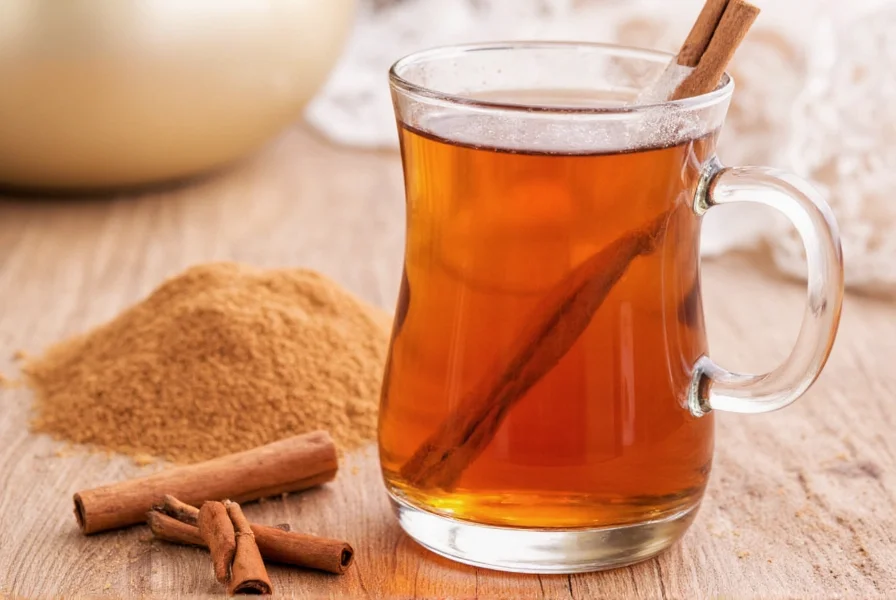Based on current scientific evidence, cinnamon tea may offer several health benefits including potential blood sugar regulation, antioxidant properties, and anti-inflammatory effects. However, most research has been conducted on cinnamon itself rather than specifically on cinnamon tea, and human studies are limited. The benefits should be viewed as complementary to, not replacements for, medical treatment.
For those seeking natural ways to support overall wellness, cinnamon tea has gained popularity as a comforting beverage with potential health advantages. This fragrant herbal infusion combines the warming spice of cinnamon with the soothing properties of tea, creating a drink that's both enjoyable and potentially beneficial for health-conscious individuals.
Understanding Cinnamon Tea and Its Active Components
Cinnamon tea is typically made by steeping cinnamon sticks or powder in hot water, sometimes combined with black, green, or herbal teas. The key bioactive compounds in cinnamon responsible for its potential health effects include cinnamaldehyde, eugenol, and polyphenols. These compounds give cinnamon its distinctive flavor and aroma while contributing to its antioxidant and anti-inflammatory properties that may translate to health benefits when consumed as tea.
Evidence-Based Health Benefits of Cinnamon Tea
While research specifically on cinnamon tea is limited, studies on cinnamon itself provide insight into potential benefits when consumed in tea form. Let's examine what science tells us about the health-promoting properties of this popular beverage.
Blood Sugar Regulation Support
One of the most researched potential benefits of cinnamon relates to blood sugar management. Multiple studies suggest that cinnamon may improve insulin sensitivity and help moderate blood glucose levels after meals. A 2013 meta-analysis published in the Journal of Medicinal Food found that cinnamon supplementation was associated with significant reductions in fasting blood glucose levels. When consumed as tea, cinnamon may provide these benefits in a gentle, easily incorporated form, making it particularly relevant for those exploring natural approaches to support healthy blood sugar levels.

Antioxidant Powerhouse Properties
Cinnamon ranks exceptionally high on the ORAC (Oxygen Radical Absorbance Capacity) scale, which measures a food's antioxidant capacity. The polyphenols in cinnamon tea act as powerful antioxidants that help combat oxidative stress in the body. Research published in the journal Oxidative Medicine and Cellular Longevity indicates that cinnamon's antioxidant properties may help protect cells from damage caused by free radicals. Regular consumption of antioxidant-rich beverages like cinnamon tea may contribute to overall cellular health and potentially reduce the risk of chronic diseases associated with oxidative stress.
Anti-Inflammatory Effects
Chronic inflammation is linked to numerous health conditions, and cinnamon contains compounds with demonstrated anti-inflammatory properties. A study in the journal Food Chemistry found that cinnamon extract inhibited several markers of inflammation. When consumed as tea, these anti-inflammatory compounds may help support the body's natural inflammatory response. This makes cinnamon tea potentially beneficial for those seeking natural ways to support joint health and overall wellness through dietary approaches.
Heart Health Support
Preliminary research suggests cinnamon may positively affect several markers related to cardiovascular health. Studies have shown potential benefits for cholesterol levels, with some research indicating reductions in LDL ("bad") cholesterol and triglycerides while maintaining HDL ("good") cholesterol levels. While more research specifically on cinnamon tea is needed, incorporating this flavorful beverage into a heart-healthy diet may provide complementary support for cardiovascular wellness.
| Benefit | Scientific Support Level | Key Research Findings |
|---|---|---|
| Blood Sugar Regulation | Moderate | Multiple studies show improved insulin sensitivity and reduced fasting glucose |
| Antioxidant Properties | Strong | High ORAC score; effective free radical scavenging in multiple studies |
| Anti-Inflammatory Effects | Moderate | Shown to inhibit inflammatory markers in laboratory studies |
| Heart Health Support | Preliminary | Some evidence of improved cholesterol profiles; needs more human research |
Important Considerations and Limitations
While the potential benefits of cinnamon tea are promising, it's crucial to understand the limitations of current research. Most studies have examined cinnamon supplements or extracts rather than specifically testing cinnamon tea. Additionally, many studies have been conducted in test tubes or on animals, with fewer human clinical trials. The concentration of active compounds in homemade cinnamon tea can vary significantly based on preparation methods, type of cinnamon used, and steeping time.
Cassia cinnamon, the most common variety found in supermarkets, contains coumarin, which in large amounts may cause liver issues for sensitive individuals. Those with liver conditions or taking medications should consult with healthcare providers before consuming cinnamon tea regularly. Ceylon cinnamon, sometimes called "true cinnamon," contains much lower levels of coumarin and may be a better choice for regular consumption.
How to Prepare Cinnamon Tea for Maximum Benefits
To prepare cinnamon tea that potentially maximizes the extraction of beneficial compounds, use one 2-3 inch cinnamon stick or 1/2 teaspoon of ground cinnamon per cup of water. Bring water to a boil, add cinnamon, then reduce heat and simmer for 10-15 minutes. Longer steeping times may increase the extraction of beneficial compounds. Adding a slice of lemon can enhance the absorption of certain antioxidants, while a small amount of black pepper may increase the bioavailability of some compounds.
For those exploring natural approaches to wellness, incorporating cinnamon tea into a balanced diet and healthy lifestyle may provide complementary support. The natural sweetness of cinnamon can also help reduce cravings for added sugars, making it a valuable addition to dietary approaches focused on reducing sugar intake.
Conclusion: A Balanced Perspective on Cinnamon Tea Benefits
Cinnamon tea offers a pleasant, aromatic beverage with potential health-supporting properties backed by growing scientific interest. While not a miracle cure, it represents a simple, enjoyable way to incorporate beneficial plant compounds into daily routines. As with any natural approach to wellness, cinnamon tea should be viewed as part of a comprehensive health strategy rather than a standalone solution. Those with specific health conditions should consult healthcare professionals before making significant dietary changes.
Frequently Asked Questions
How does cinnamon tea affect blood sugar levels?
Research suggests cinnamon may improve insulin sensitivity and help moderate blood glucose levels after meals. A 2013 meta-analysis found cinnamon supplementation was associated with significant reductions in fasting blood glucose. However, most studies examined cinnamon supplements rather than specifically tea, and effects may vary based on preparation method and individual factors.
What's the difference between Cassia and Ceylon cinnamon for tea?
Cassia cinnamon (common in supermarkets) contains higher levels of coumarin, which in large amounts may cause liver issues for sensitive individuals. Ceylon cinnamon ('true cinnamon') contains much lower coumarin levels and is generally preferred for regular consumption. Both varieties offer similar potential health benefits, but Ceylon is considered safer for daily use.
How much cinnamon tea should I drink daily for health benefits?
There's no established daily amount for cinnamon tea specifically. Most studies on cinnamon used 1-6 grams (about 1/2 to 2 teaspoons) of cinnamon powder daily. When preparing tea, using one 2-3 inch cinnamon stick or 1/2 teaspoon of powder per cup, consumed 1-2 times daily, is a common approach. Those with health conditions should consult healthcare providers before regular consumption.
Can cinnamon tea help with weight loss?
While some preliminary research suggests cinnamon may help regulate blood sugar and reduce cravings, there's no strong evidence that cinnamon tea alone causes significant weight loss. It may support weight management efforts as part of a comprehensive approach by potentially reducing sugar cravings and providing a satisfying, low-calorie beverage option.











 浙公网安备
33010002000092号
浙公网安备
33010002000092号 浙B2-20120091-4
浙B2-20120091-4